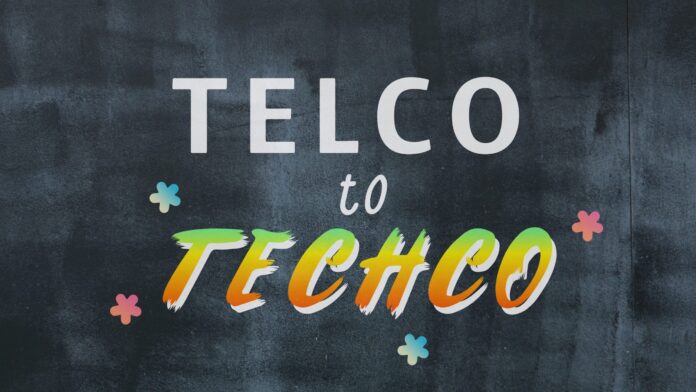Prompted by some late opportunism by Spain-based Telefónica, which has just issued a press note (widely covered) to declare itself the best telco-born ‘techco’ in Europe, six months after the research was first released, RCR Wireless has returned to the original assessment by analyst house Omdia to count-down the top five mobile operators in the world (as of 2024) for digital (telco-to-techco) reinvention. Because Telefónica, despite its good work, only places fourth.
As per the below graphic – which shows the top 12, actually – Omdia places a trio of Asia Pacific (APAC) firms in the top spots in the league table, leading the charge from their peers in Europe and North America. In order, China Mobile, NTT, and SK Telecom – in China, Japan and South Korea, respectively – have made the best progress so far at combining traditional telecoms with adjacent ‘technology’ services, and reinvented themselves nominally as ‘tech-cos’, says the firm.

Telefónica ranks fourth in the benchmark, and highest among the non-APAC also-rans – reflecting its “progress as a provider of cybersecurity and other enterprise digital services”, including IoT and AI, via its dedicated Telefónica Tech business division, created in 2019. US-based AT&T, UK-based Vodafone, and UAE-based e& (Etisalat) are tied in fifth – and effectively round out this RCR top-five review. Generally, operators are making “good progress”, says Omdia.
For the record, Reliance Jio in India is just behind in sixth (eighth in the list); France-based Orange and Germany-based Deutsche Telekom are joint-seventh (nine and 10, out of 12 in the list). Axiata in Malaysia and MTN in South Africa bring up the rear. Curiously, perhaps, the likes of China Telecom and China Unicom (both in China), Softbank (Japan), Verizon and T-Mobile US (US), BT/EE (UK), América Móvil (Mexico), and Bharti Airtel (India) do not get a mention.
Telefónica, six months late, explains the whole techco shtick: “This evolution… drives a strategic change that involves offering each customer customised digital solutions… [so they can] compete in an increasingly demanding and dynamic market.” It also takes the opportunity to talk about its 6,000 digital “experts” with 4,000 “certifications in digital skills”, and how it is unbundling and “softwarising” its network architecture globally to make it fit for purpose.
It writes: “By promoting network autonomy through data management, AI and ML, the network will be better adapted and more resilient and sustainable, bringing benefits such as higher quality of services, better allocation of resources, and minimization of operating costs.” It mentions, as well, its role in the GSMA’s global telco Open Gateway initiative, to develop programmable networks via APIs; it has 10 APIs, in total, and an open network platform in Brazil, Spain, and Germany, it says.
Mario Silva, strategy and business transformation director at Telefónica Tech, says: “We lead the transformation and evolution of the societies and economies of the countries where we operate, thanks to the development of cloud computing capabilities, cybersecurity, IoT, Data and Artificial Intelligence. We offer innovative, differentiated, and sustainable solutions that contribute to a more digital and connected future.”
But enough of Telefónica; here is an edited Omdia review of the rest of the top five telco-born techcos – lifted from the original press statement in April, and front-loaded in terms of content towards China Mobile, as the top-placed finisher. All the below quotes are from Omdia.
1 | CHINA MOBILE
“China Mobile ranks first in the telco-to-techco benchmark with a score of 31 points out of a potential maximum of 40, based on the scale of its high-speed broadband platform; its capabilities in AI, big data, and security; and its portfolio of enterprise digital services and vertical market solutions. Digital transformation revenue, which is China Mobile’s term for revenue from new digital services, accounted for 29.4% of China Mobile’s service revenue in 2023, an increase of 22.2% year on year, according to the company’s reports.”
2 | NTT (30/40)
“NTT ranks second in the benchmark, (scoring 30 out of 40), reflecting its strengths in software services and in the enterprise market.”
3 | SK TELECOM (28.5/40)
“SK Telecom, which ranks third (with 28.5/40), recently unveiled a new strategy to become a global AI company. SK Telecom’s new AI services include an AI-based digital assistant, A., which it plans to launch around the world, with other telcos.”
4 | TELEFONICA (27/40)
As above, Telefónica ranked relatively well (27/40) because of its Telefónica Tech unit; it led the non-APAC runners and riders.
5 | AT&T, E&, VODAFONE (all 26/40)
“AT&T, e&, and Vodafone rank equal-fifth in the benchmark. AT&T says that being an early adopter of AI has helped it to make operating cost savings of $6bn. e& adopted a new strategy in 2022 to become a leading global technology and investment group and has acquired or developed assets and capabilities in multiple digital service and technology areas. Vodafone has increased its focus on the business market, including enterprise digital services, and aims to expand its IoT operation, already the largest of its kind outside China, as a standalone unit in partnership with Microsoft.”

